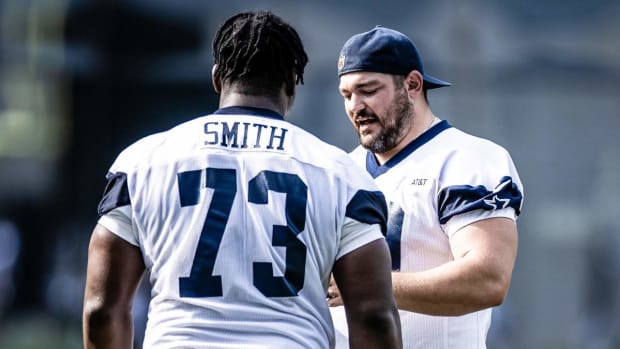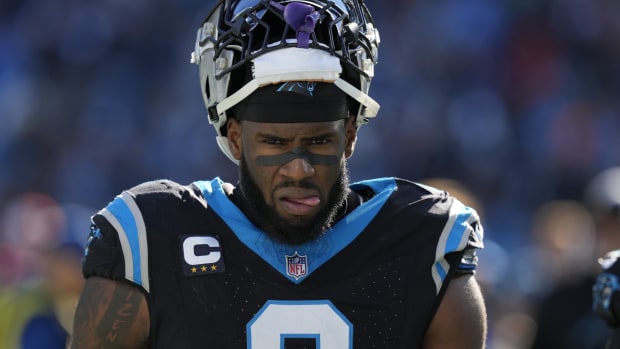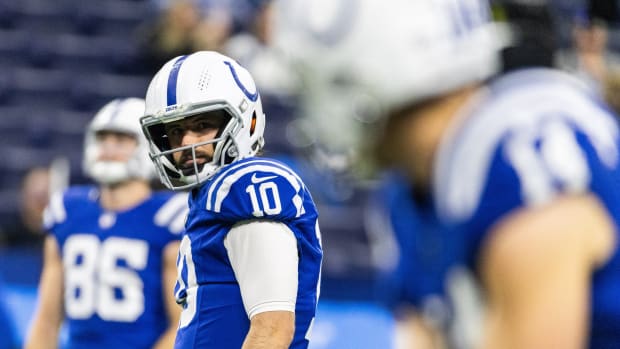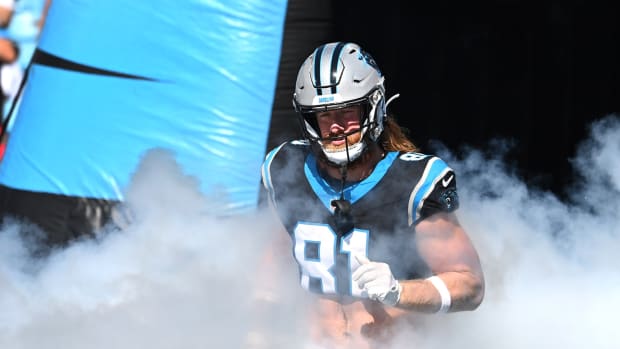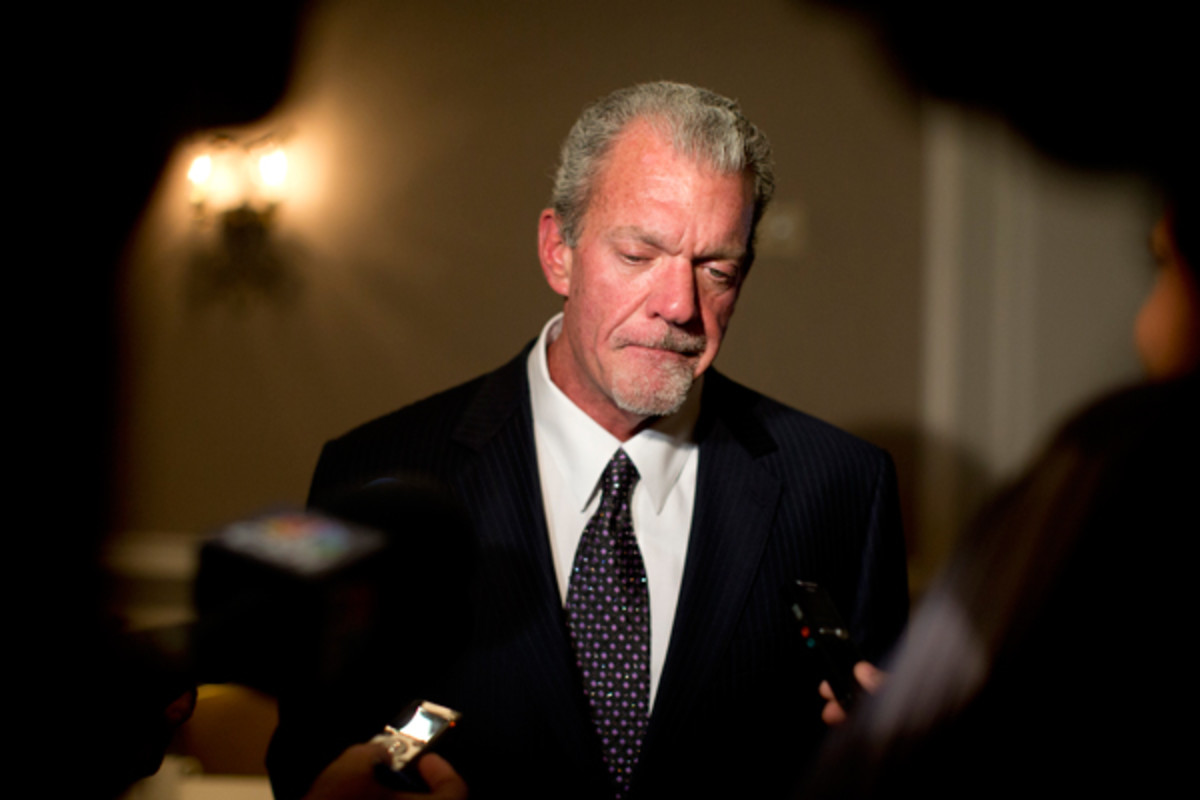
Colts owner Jim Irsay arrested on DUI, possession charges
Jim Irsay found himself in the public eye again ... for all the wrong reasons. (Carolyn Kaster/AP)
You have reached your limit of 4 premium articles
Register your email to get 1 more
Indianapolis Colts owner Jim Irsay was arrested Sunday night on preliminary charges of operating a vehicle while intoxicated and possession of a controlled substance. He faces four felony counts in total. Bond was set at $22,500, according to the Indianapolis Star, and Irsay was released from prison around 1:30 ET.
Irsay failed several roadside field sobriety tests, according to Carmel police, and in the course of searching Irsay's car, "multiple prescription drugs were discovered in pill bottles. These Schedule IV prescription drugs were not associated with any prescription bottles found in the vehicle."
In a tweet he sent out on Oct. 31, 2013, Irsay said that he hadn't had a drink in 15 years. Irsay, who took control of the team from his father, Robert, in 1995 after the elder Irsay suffered a stroke, is an active participant in social media, often breaking Colts news himself. When Robert Irsay died in 1997, Jim Irsay entered into a legal battle with his stepmother for total control of the team, eventually becoming the youngest owner of an NFL team at age 37.
“We are gathering information at this time regarding last night’s incident involving Jim Irsay," the team said in a statement. "The team will issue additional statements when the facts are sorted and we are aware of the next steps to this process. Many fans have reached out to express their concern and we appreciate their support.”
One source told Bob Kravitz of Indystar.com that Irsay is "a sick, sick man. He desperately needs help.'' ESPN's Adam Schefter echoed that, reporting (via ProFootballTalk) that there is concern for Irsay within the Colts' organization. “There are people around the Colts organization who have been suspicious about some of his behavior,” Schefter said on SportsCenter.
[si_video id="video_F9D39CDB-A7F0-D8AA-BC2F-D183F11E2EF3" height="470"]
Irsay's arrest will certainly be a topic of conversation at the annual league meetings, to be held in Orlando next week.
“All persons associated with the NFL are required to avoid ‘conduct detrimental to the integrity of and public confidence in the National Football League,’” the NFL's personal conduct policy states. “This requirement applies to players, coaches, other team employees, owners, game officials, and all others privileged to work in the National Football League.”
The situation which perhaps most closely mirrors Irsay's happened in 2010, when NFL commissioner Roger Goodell fined Detroit Lions president Tom Lewand $100,000 and suspended him for 30 days (later reduced to 21) after Lewand was convicted on a charge of operating a motor vehicle while impaired.
"You occupy a special position of responsibility and trust and -- as you have publicly acknowledged -- your conduct must be consistent with someone in that position," Goodell wrote in a letter to Lewand. "As we have discussed, those who occupy leadership positions are held to a higher standard of conduct that exceeds what is ordinarily expected of players or member of the general public.
"I commend you for your candor, your willingness to accept responsibility and your publicly stated recognition that this incident affects the reputation of the Lions and the NFL."
Of course, suspending an owner is a different story. The only time that's happened in the modern era was when former San Francisco 49ers owner Edward DeBartolo Jr. was suspended for a year in 1999 and fined $1 million after he was convicted of convicted of failure to report a felony. DeBartolo had paid what has been described as $400,000 in extortion money to former Louisiana Gov. Edwin Edwards in exchange for a riverboat gambling license approval. DeBartolo eventually ceded control of the team.
"Eddie pled guilty to a criminal charge, and it was pretty clear that had to be addressed under the rules of the league relating to the integrity of the conduct of people in the league," former commissioner Paul Tagliabue told NFL Films years later.
After several surgeries in the 1990s, Irsay developed an addiction to the prescription painkiller Vicodin. He was a walk-on football player at SMU and later got into powerlifting.
"It's a lifelong thing," he said in January 2007. "It's something you deal with every day for the rest of your life. For me, it's been tremendous, because when you overcome a potentially fatal disease, it gives you such gratitude. It gives you such appreciation for different things. It gives you a lot of humility and you root for others who have to go through it.
"As we know about addictions, they are a progressive disease," he said. "A lot of people won't seek help because they are worried they will be stigmatized their whole life. People think it's a weakness, not an illness."


































